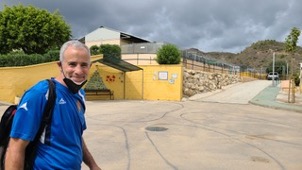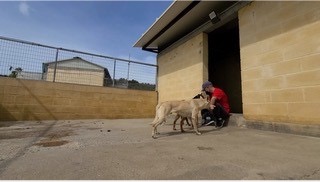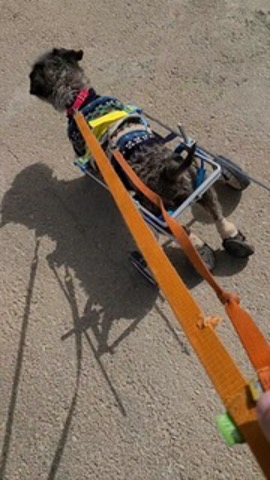By Alyssa Marchese, Volunteer Writer

Have you ever wondered what it would be like to volunteer at an animal shelter in a different country? To better understand what an experience like this entails, I spoke with Hector Jimenez, a Dumb Friends League volunteer who recently volunteered at a shelter in Spain.

When Hector and his wife decided to take a vacation to Málaga, Spain for six weeks, Hector thought that volunteering at a local shelter would be a great opportunity. After doing some research, Hector contacted Sociedad Protectora de Animales y Plantas de Málaga and signed up to volunteer. The shelter is located just outside Málaga, a city of about 500,000 people. Designed with individual and group kennels housed into multiple semi-open dwellings, the shelter accepts dogs and cats and has even acquired more than 100 turtles who live in an enclosure at the facility’s entrance.
I asked Hector to describe the organization’s volunteer program, since animal shelters usually operate their volunteer services differently. He explained that senior volunteer leaders assign new volunteers a group of 15 to 20 dogs whom they will always work with during their shifts. Since volunteers play such an integral role at the shelter, they perform a variety of tasks, including providing dogs with special meals, cleaning kennels, walking dogs, administering medications, socializing fearful dogs, bathing and grooming dogs, and assisting with physical therapy for dogs who are immobile below the waist. Notably, Málaga differs from other shelters in that they require volunteers to pay for volunteer opportunities. According to Hector, this policy is in place because the shelter is private and their operations rely greatly on financial donations from the public, including volunteers.

Additionally, the shelter stays secure at night by having select shelter dogs guard the premises. The current “guard dogs” are Bruno, a Saint Bernard, and Bady, a black Labrador retriever. Bruno and Bady live permanently at the shelter because of behavioral issues that have made them difficult to adopt. Volunteers often scatter treats around the shelter for the two dogs to find while they are on duty, making for the perfect midnight snack.
Since Málaga is a big city with limited living space, there are often more challenges for residents when it comes to owning larger pets. As such, it’s not uncommon for medium and large breeds of dogs to be at the shelter for extended periods of time. Longer stays at the shelter typically lead to strong connections between people and pets. During his volunteer service, Hector became especially bonded with Pitu, a shih tzu, and Lupa, a chihuahua. As both pups were paralyzed, they required physical therapy to improve their mobility and relieve their discomfort. As someone who lacked prior experience with canine physical therapy, Hector was initially terrified to perform such a critical task. But once he viewed videos of the physical therapy stretches, he felt more confident to assist. After working with Pitu and Lupa for just a few weeks, massive improvements were made. Hector commented,
In the beginning, it seemed like these dogs would never regain motion in their legs, so it was truly a miracle to witness them gradually begin to move again. In fact, Pitu was able to run short distances on all four legs by the end of my time at the shelter. It felt so rewarding to know I helped with that.
When asked about the most enriching experience he had at the shelter, Hector replied, “Volunteering at Málaga gave me great joy. During my time there, I felt like I was a member of a large family whose central goal was to enhance the lives of the shelter dogs and to help find them a home.” Hector encourages others to volunteer at animal shelters while traveling since it provides such a sense of fulfillment.


